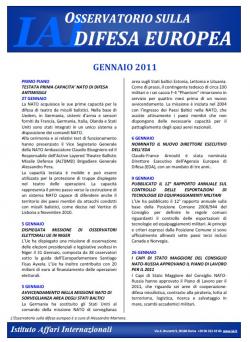Observatory on European defence, February 2003

February 2003
Europe - Iraq
The evolution of the Iraqi crisis dominated the month of February.
On 5 February, different positions emerged between the Permanent Members of the UN Security Council; the United States and the United Kingdom affirmed that Iraq is not behaving in accordance with UN Resolutions and should face the consequence of its actions, while France, Russia and China opposed the use of force and were in favour of continuing with the inspection regime.
On 10 February, France and Germany proposed a plan to enhance the inspections (so-called Mirage plan); the UK argued against this initiative.
On 16 February, the NATO Defence Planning Committee (DPC), in which France is not represented, authorised the planning of a possible deployment of NATO assets to defend Turkey in accordance with Article 4 of the Washington Treaty, overcoming doubts expressed by some members.
On 19 February, the DPC ordered the implementation of this Plan and the deployment to Turkey of AWACS airplanes, Patriot missile defence systems as well as WMD defence assets.
18 February witnessed an extraordinary European Council, promoted by the Greek Presidency and prepared by an informal meeting of the EU Foreign Ministers. The Council reached a common European Union position on the crisis, stating support for the UN disarmament and inspection mission and demanding Iraq to respect UN Resolutions; the statement did not exclude the use of force as last resort, in case of Iraq’s failure to obey.
On 18 February, the 13 EU Candidate Countries endorsed this declaration.
On 24 February, the External Relations Council discussed the evolution of the Iraqi crisis and took note of the different positios among member states with regard to a further Resolution allowing the use of force. This proposal was put forward by the USA and received support from the UK and Spain, while France and Germany opposed.
The international crisis is leading towards an open military confrontation and the divisions among European countries present in January seem to remain. The difficult agreement reached at the European Council is of limited scope and has already been weakened subsequent differing national declarations. The long-term effects of this crisis are uncertain; but a strategy limiting the possible negative impact on the international security institutions, in particular the UN, NATO and the European Union, must be pursued.
February 2003
Europe and Defence - Bilateral and Informal Initiatives
The French-British Summit of Le Touquet on 4 February issued a bilateral proposal for the development of a European Agency for the acquisition of defence capabilities. This proposal, together with a similar one from the Greek Presidency, was discussed on 10 February by the informal meeting of the EU Defence Ministers.
The Italian-British Summit in Rome on 21 February issued a bilateral declaration on defence. The two countries are willing to support the fight against international terrorism and the military and political strengthening of NATO and ESDP, as well as the improvement of present procurement and defence industry cooperation, through the creation of a European agency for the development of military capabilities.
On 10 February, Germany and The Netherlands, with the assistance of NATO, took over the leadership of the ISAF mission in Afghanistan.
6 February 2003
European Constitution - Defence Policy
The European Convention Presidium published the draft version of the first Articles of the future European Constitution. Some Articles concern the development of the EU’s foreign and defence policy.
According to article 10 paragraph 4, the EU will have specific competence in this sector and its actions should be backed by the member states (article 14).
The final version of the articles will be presented to the Intergovernmental Conference which is to adopt the new Treaty.
The present draft seems to reflect a rather traditional approach to foreign and defence policy; essentially, it reflects the provisions already written in the Treaties. The Presidium should probably be more proactive, but it will only be possible to make a comprehensive evaluation when all the articles regarding the future of CFSP and ESDP are drafted.
7 February 2003
ESDP Mission Macedonia - Commander Appointment
The European Council appointed NATO Deputy SACEUR, Admiral Feist, Operational Commander of the future EU military mission in Macedonia-FYROM. The French General Marale was appointed Force Commander.
The EU will take over from NATO once the relevant procedures are settled.
24 February 2003
General Affairs Council and External Relations - Relations with NATO
The EU General Affairs Council approved a EU-NATO agreement on the security of classified information. The Council confirmed its willingness to take over the NATO mission in Macedonia-FYROM as soon as possible, once the arrangements with the Atlantic Alliance become operational.
Some members (among which France and the United Kingdom) proposed that a transfer of authority of the present NATO SFOR mission in Bosnia should take place in 2004.
-
Details
Roma, Istituto affari internazionali, 2003 -
Issue
03/02


